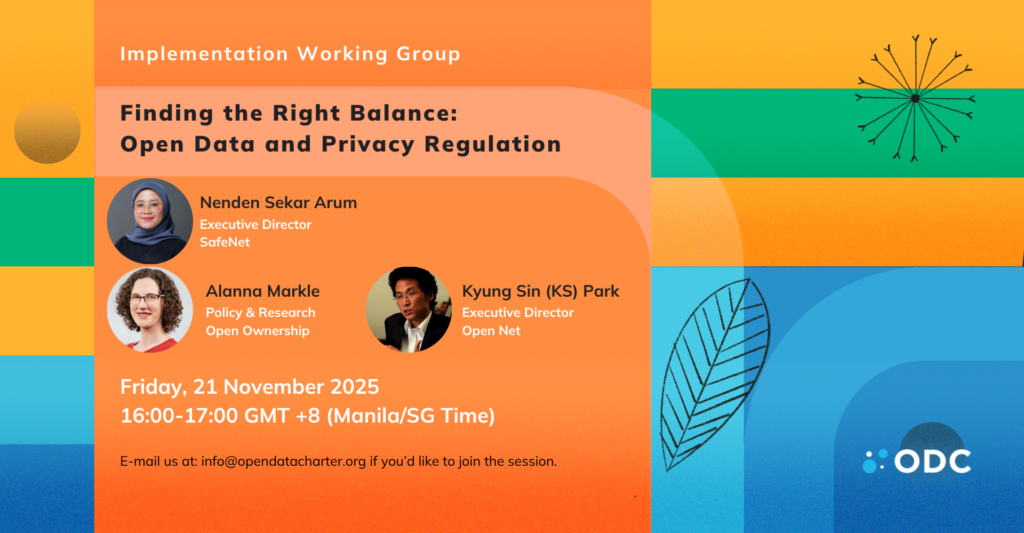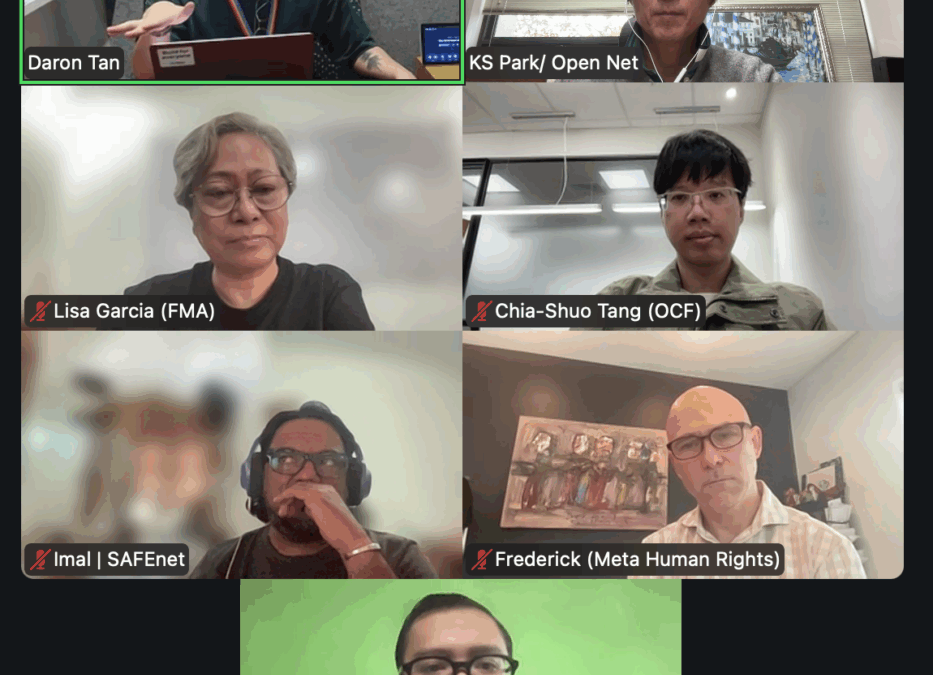
Open Net co-hosted the following event with UN Office of Higher Commissioner on Human Rights :
Convening of Regional Civil Society Organizations in East Asia on Digital Rights
Digital rights landscape in East Asia: current state of play, challenges, and best practices
Friday, August 16, 2024, 2:00 – 4:00 PM KST
Venue: College of International Studies/ Graduate School of International Studies Room 115, International Studies Hall, Korea University
145, Anam-ro, Seongbuk-gu Seoul 02841, Republic of Korea
The UN Human Rights Office (OHCHR) is organizing a regional convening to engage civil society organizations (CSOs) in discussing digital rights in the East Asia region. A particular emphasis will be placed on recent regulatory and policy developments in the region to understand current challenges and opportunities in advancing digital rights. The conversation will discuss the role of the UN Guiding Principles on Business and Human Rights and the international human rights framework more broadly to inform discussion about technology governance, as well as the role of human rights in technical standard setting relating to digital products and services. This convening aims to gather perspectives from regional CSOs, share best practices, and address emerging challenges in the digital rights landscape in the region and identify future areas for potential cooperation.
The convening will be conducted under Chatham House Rule to encourage open and trustworthy discussions.
Objectives
With a dedicated regional focus on East Asia, this discussion, coordinated by UN Human Rights (OHCHR), Open Net, Human Asia, and the International Human Rights Center at Korea University, aims to:
– Facilitate a meaningful and open exchange among OHCHR and civil society organizations – centering on civil society in the East Asia region – to discuss thematic priorities regarding human rights in the digital space (digital rights);
– Delve into pressing issues in relation to technology and human rights and address challenges faced by CSOs in the region at the country, regional, and global levels;
– Explore avenues for civil society collaboration, including with OHCHR, as well as other relevant UN agencies, bodies, and mechanisms.
Questions for discussion:
– Which are the key trends of policy and regulatory approaches affecting human rights in the technology sector?
– What is the status quo of company practice in the region regarding responsible technology governance and the uptake of the UN Guiding Principles on Business and Human Rights?
– How can digital rights inform technical standard-setting processes for digital products and services?
– What is the current regulatory environment as well as key issues regarding platform governance in East Asia and how can governments best uphold human rights while regulating online platforms to combat
issues such as hate speech and disinformation?
This convening is facilitated with funding from the European Union.
Agenda
14:00-14:10: Introduction and opening remarks by co-organizers (Korea University International Human Rights Center, OpenNet, Human Asia)
14:10-14:20: Introduction, UN Human Rights Office
14:20-15:45: Roundtable discussion (each CSO representative is invited to speak for ~5 minutes on main challenges, opportunities, and key issues in regard to the discussion questions above).
15:45: Wrap-up and concluding remarks
Background on the B-Tech Project
The B-Tech Project provides authoritative guidance and resources for implementing the UNGPs in the technology sector. In 2019, UN Human Rights launched the project after consultations with civil society, business, States, and other experts about the scope of the B-Tech Project, including consultations hosted in Seoul. The engagement this year will build on these initial conversations and deepen the exchange about responsible business conduct in the technology sector.
Background on OHCHR’s work on technical standards and human rights:
Mandated by the Human Rights Council Resolution 47/23, OHCHR organized an expert consultation at the Human Rights Council (HRC) followed by a report examining the relationship between technical standards and human rights (A/HRC/53/42) presented to the HRC in 2023. It explores how human rights considerations can be integrated into technical standard-setting processes.
_______________________________________________________________________________________________________
KS Park’s remark:
One of the key technical standards protecting human rights is the “end-to-end” principle which allows users anywhere in the world to communicate with each other provided they are interconnected through networks that conform to basic Internet protocols. This allows removes all constraints on the uses to which the information flowing through it are put, or how users interconnect and interact with other parts of the network. “In these ways, intelligence and control is decentralized and transferred to users, who can choose how to reconfigure access to people, information, services and other technologies (World Bank, William Dutton, 2016 World Bank Report). This creates a problem for some governments because “it enables the Internet to be independent of geographical constraints and personal identification, the essential components of national sovereignty, legal jurisdiction, law enforcement, and control over political expression, cybersecurity, leaving only the internet service providers as the only technically available choke points.” (World Bank, supra.)
So those governments are already using these choke points actively to enact internet shutdowns, website blockings, SIM card registration, social media registration (often based on SIM card registration), surveillance (often based on SIM card registration), etc., on top of direct restrictions on users and their platforms. However, as these municipal actions are not coordinated, they are often ineffective, socially controversial, and politically unpopular. Those governments are seeking international coordination. Hence the multilateralism discourse. The UN Cybercrime Convention is one such example.
Whether such coordination will intrude upon the sacred technical standards of the internet is unknown yet but such risk is real. Separately from fighting for freedom of expression and privacy online, the global civil society should be ready to understand the human rights ramifications of the internet’s technical standards and protocols (see Internet Research Task Force’s 2017 “Research into Human Rights Protocol Considerations”).
_____________________________________________________________________________________________
Jiwon Son’s remark:
How can digital rights inform technical standard-setting processes for digital products and services?
Currently, there is a forum in Korea, which discuss ways to establish domestic AI ethics standards and make the AI tech companies actively apply them. it is a government-led forum but member are private experts. I am serving as a member of that forum. Based on the advice of this forum, the government establishes related policies.
It is just a guideline, not compulsory one, as it is literally an “ethics” standard. And that is almost similar to the AI ethics standards or principles declared by international organizations.
Furthermore, it created more specific detailed standards and items to determine compliance with each of these AI ethics principles.
And it plans to select the AI technology field that can have the greatest impact on human rights, and plans to conduct a kind of impact assessment on how much representative AI services in this field comply with these detailed standards. This is to encourage technology operators to comply with AI ethics standards.
Of course, it’s hard to turn abstract ethical standards into objective technical standards. But I think activities like this by the government, the international organization, and civil groups (like RDR) are likely to help ethics or digital rights become one of the standards in setting technical standards.
– What is the current regulatory environment as well as key issues regarding platform governance in East Asia and how can governments best uphold human rights while regulating online platforms to combat issues such as hate speech and disinformation?
The Korean government mainly focuses on regulating expressions or informations within the internet platform, in the direction of imposing filtering, monitoring, and censorship obligations on Internet platforms.
Korea already has the strongest level of online censorship system. The Korea Communications Standards Commission, a Korean administrative agency, can request takedown of information not only illegal information but also deemed to be ‘harmful’ information. and 200,000 Internet sites or information are blocked annually.
Currently, there are frequent cases in which censorship by this administrative agency is abused to block expressions critical to the government.
In particular, this anti-democratic abuse of censorship has recently been made by current regime’s broadcasting and telecommunications regulators under the pretext of strict response to ‘fake news’ or ‘disinformation’ .
As there is no provision to sanction it just because it is ‘disinformation’ yet, so they use the deliberation clause of ‘violation of social order’ or ‘defamation’ clause.
Recently, there was a big problematic case. After the presidential office announced that it would respond strictly to the video satirizing the president, because it was “fake news,” the KCSC blocked the video for violating the “social order” and “causing social disorder” deliberation provisions.
There is also a so-called temporary measures system for Internet posts. Although the name is a temporary measure, but it is actually a defamation post takedown system. if someone claims that an online posting infringes their rights and requests to block it, the Internet operator shall take measures to block it. It is known that more than 450,000 Internet postings are blocked annually under this system, and public figures and corporations are using the system as a means of controlling public opinion on the Internet by requesting to block large amounts of Internet postings that are critical of them.
Regulatory bills that are currently being proposed are also aimed at strengthening the government’s censorship authorities and encouraging platforms to over-censorship information.
This violates users’ freedom of expression and communication secrets and freedoms, and is likely to be abused anti-democratic by the government.
I believe what the government should do to combat disinformation or hate speech is not government-led compulsory regulation, or content regulation, but to strengthen citizens’ media literacy education and create an environment where true information or minority counter speeches can be distributed more.
of norms that can be robustly preserved under multilateral control.


0 Comments